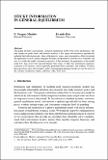| dc.contributor.author | Mankiw, N. Gregory | |
| dc.contributor.author | Reis, Ricardo | |
| dc.date.accessioned | 2009-11-20T19:12:56Z | |
| dc.date.issued | 2007 | |
| dc.identifier.citation | Mankiw, N. Gregory, and Ricardo Reis. 2007. Sticky information in general equilibrium. Journal of the European Economic Association 5(2-3): 603-613. | en_US |
| dc.identifier.issn | 1542-4766 | en_US |
| dc.identifier.uri | http://nrs.harvard.edu/urn-3:HUL.InstRepos:3415323 | |
| dc.description.abstract | This paper develops and analyzes a general-equilibrium model with sticky information. The only rigidity in goods, labor, and financial markets is that agents are inattentive, sporadically updating their information sets, when setting prices, wages, and consumption. After presenting the ingredients of such a model, the paper develops an algorithm to solve this class of models and uses it to study the model's dynamic properties. It then estimates the parameters of the model using U.S. data on five key macroeconomic time series. It finds that information stickiness is present in all markets, and is especially pronounced for consumers and workers. Variance decompositions show that monetary policy and aggregate demand shocks account for most of the variance of inflation, output, and hours. | en_US |
| dc.description.sponsorship | Economics | en_US |
| dc.language.iso | en_US | en_US |
| dc.publisher | MIT Press | en_US |
| dc.relation.isversionof | http://dx.doi.org/10.1162/jeea.2007.5.2-3.603 | en_US |
| dash.license | LAA | |
| dc.title | Sticky Information in General Equilibrium | en_US |
| dc.type | Journal Article | en_US |
| dc.description.version | Proof | en_US |
| dc.relation.journal | Journal of the European Economic Association | en_US |
| dash.depositing.author | Mankiw, N. Gregory | |
| dc.date.available | 2009-11-20T19:12:56Z | |
| dc.data.uri | http://hdl.handle.net/1902.1/10500 | en_US |
| dc.identifier.doi | 10.1162/jeea.2007.5.2-3.603 | * |
| dash.contributor.affiliated | Mankiw, N | |


